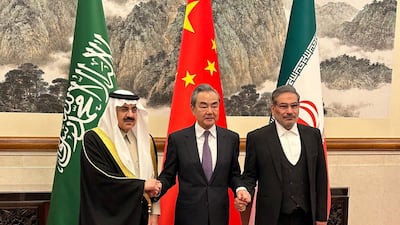Arab countries and the international community on Friday welcomed an agreement reached by Saudi Arabia and Iran to restore diplomatic relations and reopen embassies on both sides after years of tension.
The agreement came after talks hosted by China between the two countries on March 6-10, according to a communique released by the three nations.
“The Iranian and Saudi foreign ministers will meet to begin arranging the exchange of ambassadors, and discuss ways to strengthen the renewed relations,” it said.
The UAE welcomed the agreement.
Sheikh Abdullah bin Zayed, Minister of Foreign Affairs and International Co-operation, said the resumption of relations between Saudi Arabia and Iran is an important step towards stability and prosperity.
Dr Anwar Gargash, diplomatic adviser to the President, said “the UAE believes in the importance of positive communication and dialogue between the countries of the region towards consolidating the concepts of good neighbourliness and starting from a common ground to build a more stable future for all.”
The US said it was aware of reports that Iran and Saudi Arabia had restored diplomatic relations.
“Generally speaking, we welcome any efforts to help end the war in Yemen and de-escalate tensions in the Middle East region. De-escalation and diplomacy together with deterrence are key pillars of the policy President Biden outlined during his visit to the region last year,” a White House National Security Council representative said on Friday.
Iran has been enriching uranium well over the limits laid down in a major 2015 nuclear deal with world powers, which started to unravel when the US withdrew from it in 2018.
The deal — known as the Joint Comprehensive Plan of Action — was designed to give Iran sanctions relief in return for curbs on its nuclear programme.
UN Secretary General Antonio Guterres said good neighbourly relations between Iran and Saudi Arabia are essential for the stability of the Gulf region.
Mr Guterres reiterated he was ready to use his office to further advance regional dialogue to ensure durable peace and security.
The Gulf Co-operation Council said it supported all steps that contribute to boosting security and peace.
Secretary General Jasem Al Budaiwi said he “looks forward this step contributing to promoting international peace and security”.
The Organisation of Islamic Co-operation's Secretary General, Hissein Ibrahim Taha, said he hoped the agreement will “contribute to boosting the foundations of peace, security and stability in the region and give a new push to co-operation between the member states.”
Arab countries welcome agreement
Other Arab countries joined the UAE in praising the rapprochement.
Kuwait expressed support for the agreement and hoped that it would contribute to strengthening security and stability, in building trust and developing friendly relations between both countries in a way that serves the interest of the countries of the region and the whole world, the Foreign Ministry said.
Bahrain also welcomed the agreement, the country's news agency reported, quoting the foreign ministry.
Turkey said Riyadh and Tehran had taken a “significant step” that was “in conformity with the rapprochement and normalisation processes that have prevailed in the Middle East for a while”.
“This progress in the relations of the two countries would make important contributions to the security, stability, and prosperity of our region,” the Turkish Foreign Ministry said.
Qatar’s Prime Minister and Foreign Minister Sheikh Mohammed bin Abdulrahman bin Jassim Al Thani called his Saudi counterpart Prince Faisal bin Farhan on Friday to praise the deal.
The Qatari Prime Minister said he hoped the rekindling of ties would promote security and stability.
Egyptian Foreign Minister Sameh Shoukry said Cairo was “looking forward to the agreement reducing tensions in the area”.
Lebanon’s Foreign Minister Abdallah Bou Habib said the agreement would have a positive impact on all regional relations.
Lebanon hopes “this step will contribute to consolidating the foundations of security and stability in the region and cementing the constructive and positive co-operation that will inevitably benefit the region, its peoples and the world,” Mr Bou Habib said.
Iran-backed Hezbollah, the armed group and political party that has significant influence in Lebanon, also welcomed the move.
“This is a good development,” said Hezbollah leader Hassan Nasrallah in a televised address. “We have complete confidence that this will not come at our expense.”
Syria, where Iran has been a key backer of the government in the civil war that broke out in 2011, said the agreement would lead to co-operation that will “reflect positively on the common interests of the peoples of the two countries in particular and the peoples of the region in general”.
Iraq welcomed the turning of “a new page” between Iran and Saudi Arabia, its foreign ministry said.
Oman's Foreign Ministry hailed the resumption of diplomatic ties between Riyadh and Tehran.
Saudi Arabia and Iran expressed their appreciation to Iraq and Oman for hosting the rounds of dialogue that took place between the two sides in 2021 and 2022, according to the communique.
Mohammed Abdulsalam, chief negotiator of Yemen's Iran-backed Houthi movement, said in a tweet: “The region needs the resumption of normal ties between its countries for the Islamic nation to reclaim its lost security as a result of foreign interference.”
The restoration of ties raises hopes of a new truce in Yemen's civil war, where Riyadh and Tehran support opposing sides. Negotiations on a ceasefire have been continuing in recent months, including in Oman, a longtime interlocutor between Iran and the US. Some had hoped for an agreement before the holy fasting month of Ramadan, which will begin later in March.
Iran and Saudi Arabia have held off-and-on talks in recent years, but it was not immediately clear if Yemen was the impetus for this new detente.


